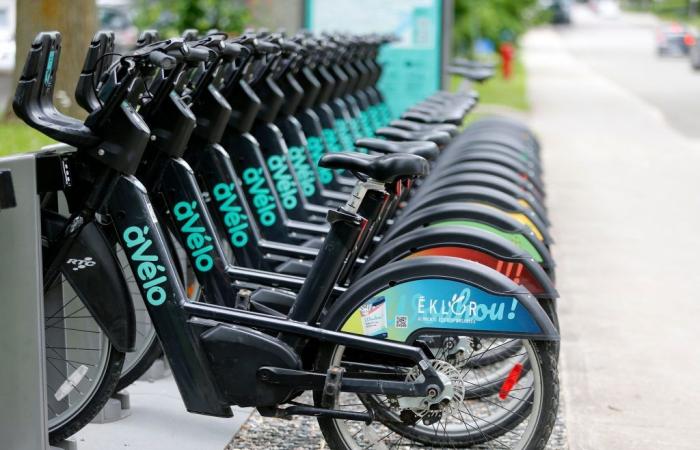BIXI, the operator of the self-service bicycle system in Greater Montreal, announced on June 13 that Sainte-Julie, in Montérégie, was joining its thriving network. Other cities in the province could also follow suit. This is good news for bike sharing in Quebec, a system complementary to public transport promoting active mobility for the population.
Now, thanks to these shared bikes, it is no longer necessary to own a bicycle to make short trips and enjoy the benefits of active transportation. Not to mention that it is both a useful and pleasant way to explore a city with such a service.
Here is an overview of the main municipal bike sharing services you can benefit from in the province.
PAY – Greater Montreal
Launched ten years ago by the City of Montreal, BIXI today has more than 11,000 bicycles, including 2,620 electrically assisted, deployed in more than 900 stations across its network. It is the largest fleet of electric bikes in Canada and one of the largest in North America, if the company is to be believed.
Sainte-Julie is therefore joining Montreal, Westmount, Mont-Royal, Montreal-East, Laval, Terrebonne, Longueuil and Boucherville this summer. The Montérégie municipality provides cyclists with 40 BIXIs — 30 electric and 10 regular (mechanical) — spread over 5 stations, including one at the exo bus terminal.
Prices – You can sign up for a monthly, seasonal or group BIXI membership, which gives you unlimited 45-minute rides on a regular BIXI; excess minutes cost $0.17 each. With your membership, renting an electric BIXI costs $0.17 per minute, regardless of the length of the ride.
You can also rent a BIXI for a one-way trip. Consult BIXI’s detailed prices on its website.
to getit – Quebec
In 2021, the City of Québec launched àVélo, a self-service electric bike-sharing service. The Old Capital thus became the first North American city to have an all-electric bike-sharing network. “For topographical challenges, this is the way to go,” says Louis Lalonde, project manager for the VÉLOSYMPATHIQUE Movement at Vélo Québec. “It’s very motivating.”
Managed by the Réseau de transport de la Capitale (RTC), àVélo includes 1,300 bicycles equipped with an integrated lock deployed in 115 stations. If you have to stop while riding — to enjoy an ice cream, for example — you can lock your bike to a rack before getting back on the road.
“The case of Quebec is more than encouraging,” rejoices Louis Lalonde. Ridership in 2023 was twice as high as àVélo expected. At mid-season, there were already 350,000 trips, which corresponds to its annual objective! »
The project manager also highlights the massive use of the service during the Quebec City Summer Festival last year. “In 12 days of the festival, there were 62,000 trips,” he explains. “In an event context, this service also took on its full meaning by helping people “demotorize” themselves to get to the site in an active way.”
In his eyes, the success of àVélo means that the latent demand for mobility is very strong.
Prices – The àVélo service offers monthly and annual subscriptions, for which you have the choice between trips of 30 minutes ($33) or 45 minutes ($38) before having to pay $0.25 per excess minute. You can also rent a bike for a single trip or join the company program offered by your employer.
Consult the detailed prices on the àVélo website.
Access Vélo – Saguenay
Operated by the Société de transport du Saguenay (STS), Accès Vélo now has nearly sixty electric bikes spread across 14 stations. You can travel on two wheels along the main arteries of Chicoutimi, Jonquière and La Baie.
Prices – Access to bicycles is free for holders of an STS monthly pass and for students of the Université du Québec à Chicoutimi (UQAC).
Accès Vélo offers monthly ($23) or seasonal ($85, 6 months) subscriptions that give you unlimited 45-minute trips; each excess minute costs $0.15. You can also rent a bike for a single trip.
REGIME – Gaspésie
Another way to explore Gaspésie? Riding the electric bikes of the Régie intermunicipale de transport Gaspésie–Îles-de-la-Madeleine (RÉGÎM), distributed between Carleton-sur-Mer, Gaspé, New Richmond and Sainte-Anne-des-Monts. Stations will also be established during the summer in Chandler and Maria. RÉGÎM indicated that the installation dates were not known at the moment.
Certainly, “there is not an astronomical quantity of bicycles or stations — a few per municipality — but the objective was to have them in six municipalities,” says Louis Lalonde.
The project manager welcomes the fact that the Gaspé department has adapted the borrowing methods to the size of its territory.
“For example, in Montreal, a subscription [BIXI] includes 45-minute journeys; beyond that, per-minute pricing applies. On the REGÎM side, the subscription is modulated for 90 minutes, he compares. At this place, we want to do longer walks, we have to cover greater distances. She was careful to adjust the service accordingly. »
Prices – RÉGÎM offers daily ($10), monthly ($25) and seasonal ($100) subscriptions. You can also rent a bike for one, two, three or four single trips, between $5 and $18 depending on the number of trips purchased.
Consult the detailed prices on the RÉGÎM website.
Projcommunity ands
Currently, in Quebec, bike sharing projects are also carried out by community groups, such as Vélo Commun-O-Terre in Dolbeau-Mistassini, in Lac-Saint-Jean. However, due to their smaller scale, “it’s hard to follow the evolution of small community players,” recognizes Louis Lalonde, of Vélo Québec. Drawing up a complete inventory would therefore prove too tedious.
In addition, in 2021, 21 municipalities and organizations received a helping hand from Quebec thanks to the Financial Assistance Program for the Development of Self-Service Bicycles (OVLIS). “This financial boost has enabled a more extensive offering than five years ago,” analyzes the project manager.
Such a program, now integrated into the Financial Assistance Program for the Development of Active Transport in Urban Areas (TAPU), certainly suggests the emergence of other municipal self-service bicycle services in the coming years.
LocoMotion
Would you like to borrow a cargo bike to ride with your children? Or a bicycle trailer to transport a load of plants? If you live in Montreal or Sherbrooke, you can turn to LocoMotion, an organization that facilitates the provision of active and shared transportation in neighborhoods.
In addition to cargo bikes and homemade bike trailers, you can borrow bikes and cars. Would you like your neighborhood to benefit from this collective service? Rally your neighborhood and consult the quick start guide as a citizen group.
Also read: How to choose a cargo bike
Cities that pedal in the right directionno direction
Does your municipality implement a cycling culture? To find out, consult the list of communities certified by the VÉLOSYMPATHIQUE movement of Vélo Québec.
The VÉLOSYMPATHIQUE movement helps cities, their districts, organizations and post-secondary institutions to promote the practice of cycling within their community and rewards their actions and commitment in this regard with certification.
Electric bikecudgel: helmet required
Please remember that when riding an electric bike in the province, wearing a helmet is mandatory under the Road safety code. If you violate this rule, you risk a fine of $60 to $100.
In addition, remember that, to have the right to drive an electric bike, a person must be at least 18 years old, while young people aged 14 to 17 must hold a class 6D license, for scooter or moped. .
However, with a view to encouraging the spontaneous use of self-service bicycles, Louis Lalonde wonders whether it would not be wise to adapt the Code as well as the power of electric bicycles.
“Could we, for example, reduce the speed of electric bikes to 25 km/h and stop requiring the wearing of helmets to bring them back to the level of mechanical bikes? he asks himself. The self-service bicycle system is designed for spontaneous use, for short or intermediate journeys; it has to be practical. There shouldn’t be any pitfalls. There may be an adjustment to be made in the Code on this subject. »
Also read: How to choose a child’s bicycle helmet
Summern winter?
Last winter, BIXI took a significant step forward in its journey by allowing “Bixists” to cycle during the cold season. The pilot project, which took place in an area encompassing seven Montreal boroughs, made it possible to “test the equipment, collect user comments and study potential corrections to be made in order to adapt the BIXI service to bad weather in the Quebec winter,” indicates the operator.
Building on the success of its pilot project, it announced last April that the service would be offered year-round “for the next few years”.
The survey he carried out among users revealed that 65% of his customers had, thanks to the project, had their first winter cycling experience. “Excellent news which demonstrates that the offer leads more people to try to travel by bike in all seasons,” rejoices BIXI.
Over the period analyzed (i.e. four of the five months of the pilot project), BIXI counted nearly 4,900 trips per day for a total of 92,000 unique users. This is more than what was expected, while the winter network only opened 150 stations instead of 900 during the summer season.
Also read: Subsidies to buy a bike and 25 electric bikes tested






